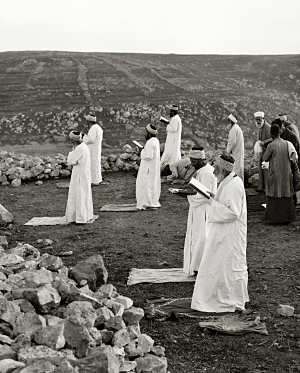Why Babylon the Great is not Apostate Christianity or the Pope
   RobertLeeRE-Here is a discussion I participated in on Xanga about 5 years ago about the False Prophets and their preaching hate and how Babylon the Great is some form of Apostate Christianity. They might say it is Cathlocism or in the case of the Jehovah Witnesses claiming everyone but them has the special key,that if you are not part of their particular group you are part of Apostate Christianity, not saved, which they also call Babylon the Great. the most common sects of Christianity and what some say are the cults out side Christianity all with these similar type of claims, Jehovah witnesses, Armstrongism, Seventh Day Adventists. Some of the Armstrongism have changed their names to hide who they are and can be classified into a huge following called the KIngdom of Yaweh. There names change a little over the years but the two things they all have in common; They all follow teh doctrine of the Judaisers and they ignore the pauline Epistles which teach salvation is by grace only, no works required.  When looking in the bible using Revelation 18:1-24 clearly no world religion fits the definition, rather Babylon the great fits only one nation and that is America
                               Babylon The Great, America
                               .I have been stirring up trouble again on Xanga. I do not mean to. I just cannot let it pass when someone teaches things that are unscriptural on Xanga in the body of Christ. These things come up forcing me to apologetically defend the warnings of the Time of the End God has clearly given the Christ followers so they can wake up to put on their wedding garments to watch and be ready.
       .I have been stirring up trouble again on Xanga. I do not mean to. I just cannot let it pass when someone teaches things that are unscriptural on Xanga in the body of Christ. These things come up forcing me to apologetically defend the warnings of the Time of the End God has clearly given the Christ followers so they can wake up to put on their wedding garments to watch and be ready. ![]()
To see the context of this first statement by veritas_verbatim go to this link at: http://www.xanga.com/bwebbjr/673176423/american-prophets–or-history-repeats-itself.html

Hi, Robert… I once theorized to myself America was Babylon but Revelation 18:24 convinced me otherwise.Â
“And in her was found the blood of prophets and of Saints and of all who have been slain on the earth.” (NASB)Â
That cannot be said of America alone…now it is possible that America is part of it but not the whole. I will concede that we as a nation have sinned before God and if perhaps that had not been part of the description I would be tempted to agree with you. Blessings, Mr. Vee
Posted 9/8/2008Â 12:19 AM by veritas_verbatim
Because Hislop wrote in the mid-1800s the books he refers to or quotes are now quite old. I made considerable effort to find these old books and to check Hislop’s references; books such as Layards Nineveh and Its Remains, Kitto‘s Cyclopeidia of Biblical Literature, Wilkinson‘s Ancient Egyptians, as well as old editions of Pausanias, Pliny, Tacitus, Herodotus and many more. When I checked his footnote references, in numerous cases I discovered they do not support his claims.
As I did this [research], it became clear-Hislop’s “history” was often only mythology… an arbitrary piecing together of ancient myths can not provide a sound basis for history. Take enough tribes, enough tales, enough time, jump from one time to another, from one country to another, pick and choose similarities-why anything could be “proved”!
Woodrow also shows how Hislop’s creative numerology (which he describes as no more than mere superstition) could be used to make almost any name ‘add up’ to the mark of the beast, including the name “The Rev Alexander Hislop.”
While seeking to condemn the paganism of Roman Catholicism, Hislop produced his own myths. Hislop theorized that Nimrod, Adonis, Apollo, Attes, Ball-zebub, Bacchus, Cupid, Dagon, Hercules, Januis, Linus, Lucifer, Mars, Merodach, Thithra, Molock, Narcissus, Oannes, Oden, Orion, Osiris, Pluto, Saturn, Teitan, Typhon, Vulcan, Wodan, and Zoraster were all one and the same. By mixing myths, Hislop supposed that Semiramis was the wife of Nimrod and was the same as Aphrodite, Artemis, Astarte, Aurora, Bellona, Ceres, Diana, Easter, Irene, Iris, Juno, Mylitta, Proserpine, Rhea, Venus, and Vesta.
Hislop taught that Tammuz (whom he says was Nimrod) was born on December 25, and that this is the origin of the date on which Christmas is observed. Yet his supposed proof for this is taken out of context. Having taught that Isis and her infant son Hours were the Egyptian version of Semiramis and her son Tammuz he cites a reference that the son of Isis was born “about the time of the winter solstice.” When we actually look up the reference he gives for this (Wilkinson’s Ancient Egyptians, vol. 4, 405), the son of Isis who was born “about the time of the winter solstice was not Hours, her older son, but Harpocrates. The reference also explains this was a premature birth, causing him to be lame, and that the Egyptians celebrated the feast of his mother’s delivery in spring. Taken in context, this has nothing to do with a December celebration or with Christmas as it is known today.
The subtitle for Hislop’s book is “The Papal Worship Proved to Be the Worship of Nimrod and His Wife.†Yet when I went to referÂence works such as the Encyclopedia Britannica, The Americana, The Jewish Encyclopedia, The Catholic Encyclopedia, The Worldbook Encyclopedia – carefully reading their articles on “Nimrod†and “Semiramis†— not one said anything about Nimrod and Semiramis being husband and wife. They did not even live in the same century. Nor is there any basis for Semiramis being the mother of Tammuz. I realized these ideas were all Hislop’s inventions.
In another appeal to Wilkinson, Hislop says that a Lent of 40 days was observed in Egypt (which Roman Catholicism celebrates) . But when we look up the reference, Wilkinson says Egyptian fasts “lasted for seven to forty-two days, and sometimes even a longer period: during which time they abstained entirely from animal food, from herbs and vegetables, and above all from the indulgence of the passions” (Wilkinson, Ancient Egyptians vol. 1, 278) With as much credibility, we could say they fasted 7 days, 10 days, 12 days, or 42 days. Hislop’s claim appears to have validity only because he used partial information.
If we based claims on partial information, we could even prove from the Bible there is not God: “…’There is no God’” (Ps. 14:1). When the entire statement is read, however, it has a different meaning: “The fool says in his heart, ‘There is no God.’”









